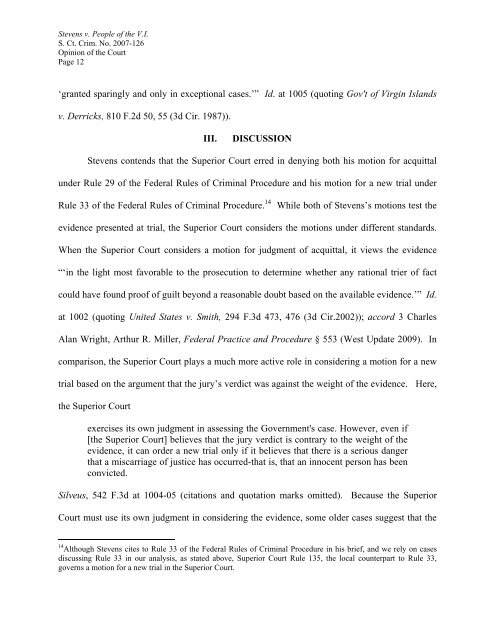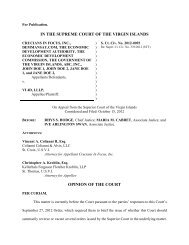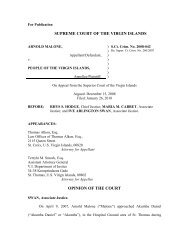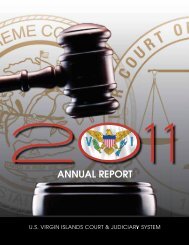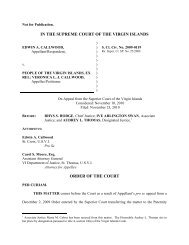IN THE SUPREME COURT OF THE VIRGIN ISLANDS OPINION OF ...
IN THE SUPREME COURT OF THE VIRGIN ISLANDS OPINION OF ...
IN THE SUPREME COURT OF THE VIRGIN ISLANDS OPINION OF ...
You also want an ePaper? Increase the reach of your titles
YUMPU automatically turns print PDFs into web optimized ePapers that Google loves.
Stevens v. People of the V.I.<br />
S. Ct. Crim. No. 2007-126<br />
Opinion of the Court<br />
Page 12<br />
‘granted sparingly and only in exceptional cases.’” Id. at 1005 (quoting Gov't of Virgin Islands<br />
v. Derricks, 810 F.2d 50, 55 (3d Cir. 1987)).<br />
III.<br />
DISCUSSION<br />
Stevens contends that the Superior Court erred in denying both his motion for acquittal<br />
under Rule 29 of the Federal Rules of Criminal Procedure and his motion for a new trial under<br />
Rule 33 of the Federal Rules of Criminal Procedure. 14<br />
While both of Stevens’s motions test the<br />
evidence presented at trial, the Superior Court considers the motions under different standards.<br />
When the Superior Court considers a motion for judgment of acquittal, it views the evidence<br />
“‘in the light most favorable to the prosecution to determine whether any rational trier of fact<br />
could have found proof of guilt beyond a reasonable doubt based on the available evidence.’” Id.<br />
at 1002 (quoting United States v. Smith, 294 F.3d 473, 476 (3d Cir.2002)); accord 3 Charles<br />
Alan Wright, Arthur R. Miller, Federal Practice and Procedure § 553 (West Update 2009). In<br />
comparison, the Superior Court plays a much more active role in considering a motion for a new<br />
trial based on the argument that the jury’s verdict was against the weight of the evidence. Here,<br />
the Superior Court<br />
exercises its own judgment in assessing the Government's case. However, even if<br />
[the Superior Court] believes that the jury verdict is contrary to the weight of the<br />
evidence, it can order a new trial only if it believes that there is a serious danger<br />
that a miscarriage of justice has occurred-that is, that an innocent person has been<br />
convicted.<br />
Silveus, 542 F.3d at 1004-05 (citations and quotation marks omitted). Because the Superior<br />
Court must use its own judgment in considering the evidence, some older cases suggest that the<br />
14 Although Stevens cites to Rule 33 of the Federal Rules of Criminal Procedure in his brief, and we rely on cases<br />
discussing Rule 33 in our analysis, as stated above, Superior Court Rule 135, the local counterpart to Rule 33,<br />
governs a motion for a new trial in the Superior Court.


